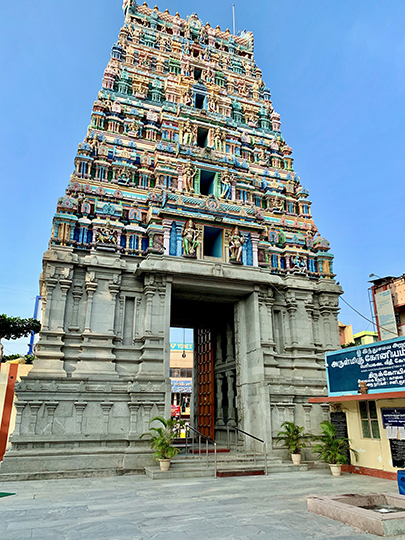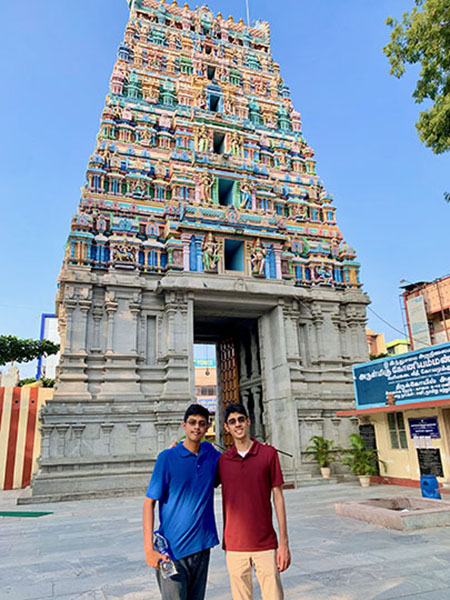Finding Peace at the Feet of the Family Goddess

By Rema Deo

In December 2019, my family and I visited Coimbatore to spend time with my cousin and his family. Along with enjoying their company, we did some sightseeing in and around the Coimbatore area, popped into some nearby towns, and even consulted an ayurvedic physician for some of our ailments. Coimbatore is known for many things including Ayurvedic treatments, high-quality cotton clothing, and more. As Tamil Nadu’s second-largest city, it also boasts what South India is renowned for – majestic, ancient temples.
One afternoon, my sister-in-law and I were out and about, heading back home, when she suddenly mentioned that the main temple for the “kuladevi” (family deity) of the paternal side of my family was pretty close to where we were. I am a bit embarrassed to admit that until then, I had not even known that my father’s family had a kuladevi (where kula means family, and devi means goddess). My sister-in-law, a deeply spiritual soul, is well-versed with the significance of different temples and of course, she used to frequently visit our family deity’s temple.
For my dad’s side of the family, their kuladevi is Koniamman (pronounced kō-nee-umm-un, a form of Goddess Parvati. She is revered as a guardian deity for numerous families, and her temple is the 500-year old Arulmigu Koniamman temple based in Coimbatore. She is also celebrated as the guardian deity of the city. One of the prominent festivals dedicated to her is the Koniamman Car Festival. One would think that a bunch of cars get involved here – but no – thousands of devotees come together to pull an intricately decorated chariot carrying the deity, through the streets of the city. It’s the chariot that is called the “temple car”. Attendees come from all over just to receive Koniamman’s blessings on this auspicious day. In 2025, the car festival took place on March 5.
 That December afternoon, once I returned home, I asked my sons if they would accompany me to visit their Thatha’s (grandpa) kuladevi. I half expected them to decline – after all, how many teenage boys would want to leave fun family games at home to visit a temple? I had clearly underestimated the strength of the bond between my sons and their Thatha. Without the slightest hesitation, both of them were ready to go. My sister-in-law then took me and my sons to see our kuladevi. It turned out to be a profoundly spiritual experience. As I stood there, visions of my father, his siblings, and my grandparents worshipping Koniamman flashed before my eyes, and I felt a remarkable sense of peace just being there – not to mention the joy that came to me when I later told my dad where I had been.
That December afternoon, once I returned home, I asked my sons if they would accompany me to visit their Thatha’s (grandpa) kuladevi. I half expected them to decline – after all, how many teenage boys would want to leave fun family games at home to visit a temple? I had clearly underestimated the strength of the bond between my sons and their Thatha. Without the slightest hesitation, both of them were ready to go. My sister-in-law then took me and my sons to see our kuladevi. It turned out to be a profoundly spiritual experience. As I stood there, visions of my father, his siblings, and my grandparents worshipping Koniamman flashed before my eyes, and I felt a remarkable sense of peace just being there – not to mention the joy that came to me when I later told my dad where I had been.
How did the concept of a family deity come about? The concept developed from years ago when all members of a family would pray to a specific local deity and somehow started associating that ancestral deity as a protector and benefactor for the family. A family could have a kuladevta (family God) or kuladevi (family Goddess), who is the protector of the family lineage, and blesses family members with prosperity and well-being.
How do you find out who your kuladevta or kuladevi is? Start by asking the elders of your family, or perhaps a family priest if your family has one. Typically, the kuladevta or kuladevi is invoked and venerated at significant life-enhancing events at the very minimum, such as weddings, childbirths, deaths, and housewarmings.
About the Author
 Rema Deo is the Managing Director at 24By7Security, a Cybersecurity and Compliance Consulting firm. She lives in South Florida with her husband. A proud mother of twin boys, she is also an active member of the local Indian community.
Rema Deo is the Managing Director at 24By7Security, a Cybersecurity and Compliance Consulting firm. She lives in South Florida with her husband. A proud mother of twin boys, she is also an active member of the local Indian community.
In addition to the professional responsibilities of her function, Rema enjoys the multi-cultural aspect of the job especially as it involves learning different languages, traveling to different countries and meeting and working with people of different backgrounds and cultures. Rema is actively involved in the South Florida community and serves as a Board Member of the Indian Regional and Cultural Center, and has also served on the Board of Trustees of the North Broward Preparatory School.































